Guinea pigs don’t require many things to be happy and healthy. This is why they are perfect pets for people of all ages.
When we talk about guinea pigs, one of the always mentioned foods is hay. But, is this particular food significant to their diet?
Do guinea pigs really need hay? Guinea pigs need hay because it’s high in fiber needed for healthy digestion. It also serves as their teeth abrasives, as their teeth keep on growing.
Not only that the quality diet produces a healthier lifestyle, but it also gives your guinea pig more energy and makes it happier. In this article, we’re going to talk about types of hay, if it should be part of your guinea pig’s diet, as well as hay in general.
Table of Content
What Is Hay?
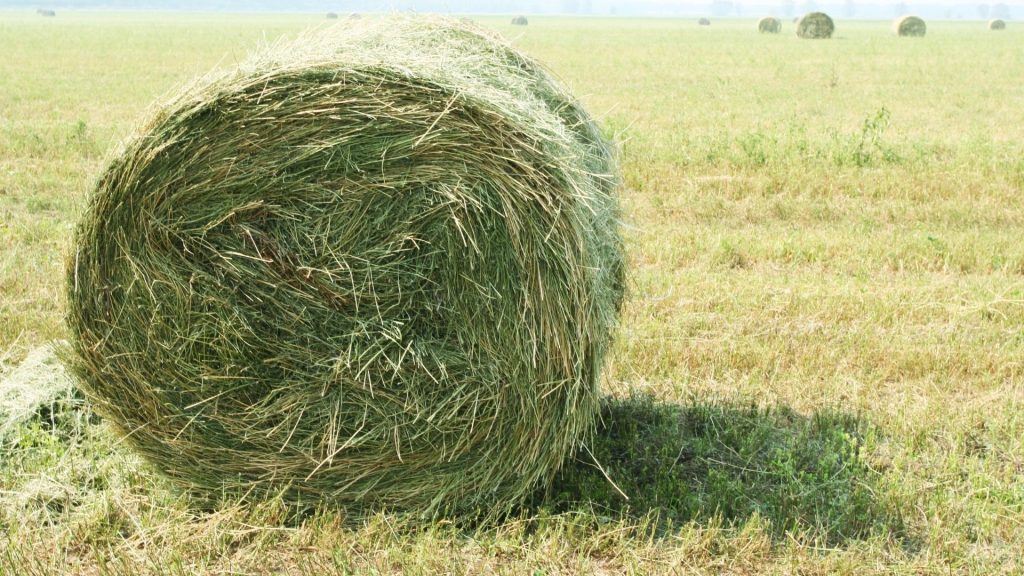
Essentially, hay is grass or legumes that have been cut, dried, and stored as food for non-carnivorous animals. These animals include livestock such as goats, sheep, horses, cattle, and similar. But, since we’re talking about guinea pigs, hay is vastly used as food for them and other small animals such as rabbits.
Not every plant can be used for hay, and some plants produce good quality, while others produce lesser quality hay. Commonly used plants are brome, fescue, Bermuda grass, Timothy grass, alfalfa, clovers, legumes, etc.
Of all these, the most popular plants are Timothy, meadow, and alfalfa, which we’re going to talk about later.
Some plants like barley, oat, and wheat are also used for hay but in the form of straw. Straw is perfect for animal bedding, especially for large animals, since they can’t injure themselves when lying down on it. On the other hand, Guinea pigs won’t benefit so much from straw.
Producing hay isn’t an easy job to do. Since hay is very sensitive to weather conditions, producing quality hay can be quite a challenge. If the conditions are drought, seed and leaf production diminishes, making the hay rough and less nutritious.
On the other hand, moist conditions produce fairly quality hay, but this type of hay is easily spoiled before it can be bailed. That’s why it’s better to buy hay from professional and verified retailers, especially when we talk about guinea pigs. They need a lot of quality hay.
Is Hay Good for Guinea Pigs?
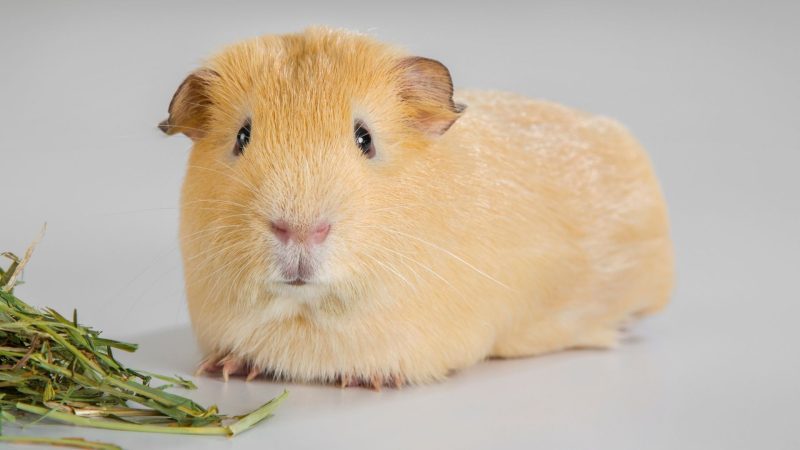
Hay is good for guinea pigs, and here are some of its benefits:
- Generally, hay contains high fiber, contributing to guinea pigs’ healthy digestion.
- Hay can also help control their teeth from growing, as it can wear down from munching on this food.
- It also contains vitamin C; although it is not enough, you can add other vitamin C-rich foods.
- There are different types of hay, and some of them contain calcium, protein, and other nutrients that can benefit the specific needs of certain guinea pigs.
Types of Hay for Guinea Pigs
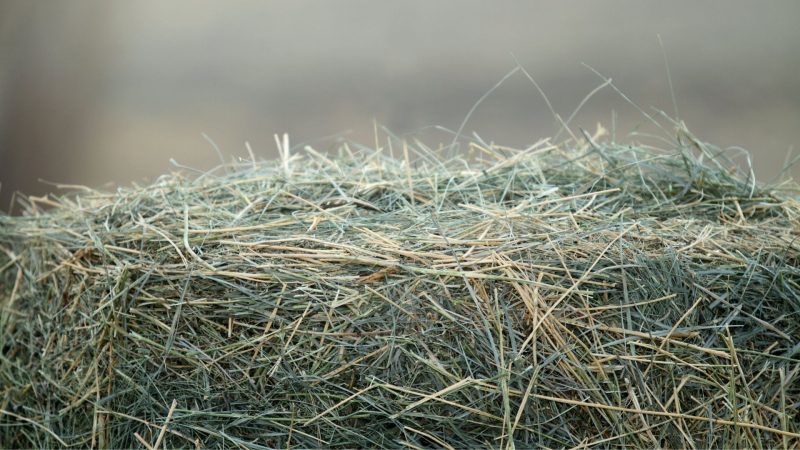
Here are the most popular types of hay for your guinea pigs:
Alfalfa Hay
Alfalfa hay is not only fed for rabbits but also for guinea pigs. This type of hay produces excellent results in baby guinea pigs, containing lots of calcium and protein, supporting healthy development.
Calcium is essential for making bones harder and denser, while protein is essential for adding muscle mass and making muscles stronger.
Given that alfalfa hay has more calcium and protein, it’s not exactly the best type of hay for all guinea pigs. Other guinea pigs don’t need as much calcium and protein, but they need vitamin C and fibers. That’s why rabbits are different and a lot bigger than guinea pigs.
However, young, pregnant, and nursing guinea pigs will benefit a lot from alfalfa hay as it contains a large portion of the nutrients needed during these specific periods of their life.
Timothy Hay
Timothy hay is used to feed large animals such as horses, cows, and other livestock. This is because this livestock needs a lot of fiber in their nutrition, similar to guinea pigs. Thankfully, timothy hay has a lot of fibers and a bit smaller amount of protein and calcium, making it ideal for guinea pigs.
The benefits of hay for guinea pigs are numerous – improves digestion, shiny coat, healthy weight, and bowel regularity.
Moreover, fibers in timothy hay can be fermented in the bowel, giving a constant energy flow throughout the day. Guinea pigs can get away with this type of hay, but larger animals are often fed with a combination of Timothy and alfalfa hay, especially horses.
Meadow Hay
Meadow hay is excellent for guinea pigs since it has less protein and more fibers. But, the amount of fibers in this hay is slightly lower than in Timothy hay, making it a bit less nutritious.
How Much Hay Do Guinea Pigs Should Eat?
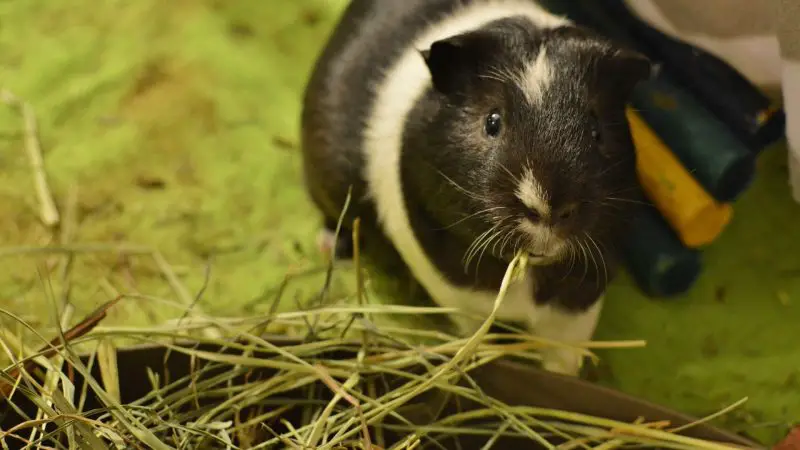
80% of guinea pig’s diet needs to be hay, and knowing the best type of hay for your guinea pig is essential. They can eat an unlimited amount of high-quality hay, as they can stop eating if they feel full.
Of course, it should always be accompanied by unlimited access to fresh and clean water, the required amount of vitamin C-rich foods, and other nutrients essential to their everyday nutrition.
How to Store Hay?
You need to have the right type of hay, but more important is keeping it free from mold. The best way to store your hay is to keep it in a dry and cool place.
Additional moisture will make it spoil fast, while a dry place will prevent mold from developing. Also, don’t store your hay for too long as it can lose its nutritional value over time. Be sure to always give your guinea pig a fresh batch of hay.
Other Essential Foods for Guinea Pigs
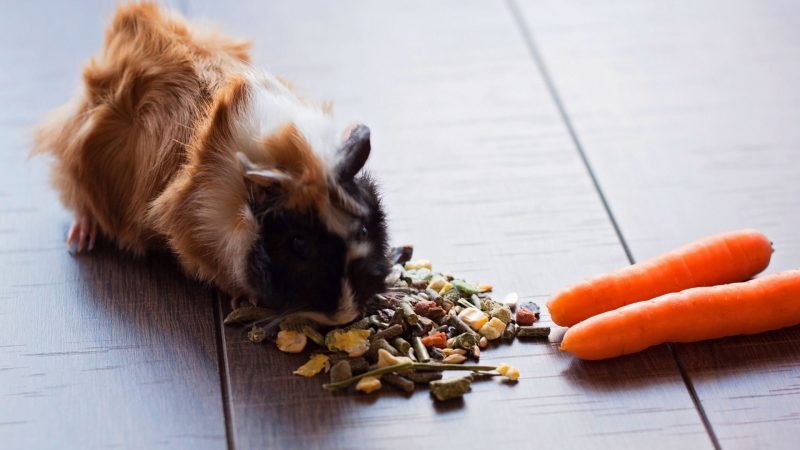
Most of guinea pig’s nutrition needs to consist of hay. However, despite their need for hay, guinea pigs can eat other foods in the right amount without any problems. Food diets rich in fiber and Vitamin C are crucial to their overall healthy body.
Here are some of the essential foods needed by guinea pigs:
Fruits and Vegetables
Herbivorous animals such as guinea pigs have many vegetables and fruits available. Your guinea pig can and should eat those every day. Usually, the most recommended vegetables and fruits are those with high fiber, such as lettuce, carrots, and sometimes cabbage.
Fruits good for guinea pigs include strawberries, melons, apples, oranges, and pears. You can combine various fruits and vegetables every day and see what your guinea pig enjoys the most.
Pellets
Pellets come in various sizes, types, brands, and prices, which is a commercial food for guinea pigs. Some popular brands that specialize in this area include KMS Hayloft and Oxbow Cavy Cuisine.
While they aren’t the most affordable, you can find their products online much cheaper than you would find them in the store. These are proven to positively impact guinea pigs in terms of nutritional balance and development.
On the other hand, most low-quality pellets have artificial sweeteners and preservatives such as corn syrup, propyl gallate, ethoxyquin, HFCS, which need to be avoided. If you see some of these, you should definitely skip that pellet.
Food Supplements
Despite the fact that hay plays a huge role in guinea pig’s nutrition, it’s still unable to give the required amount of vitamin C.
The vitamin C can be added either via supplements that you can buy in any pet shop or simply by introducing food that has a lot of vitamin C in it.
Vitamin C supplements are usually not that expensive, and they are the easy way to give your guinea pig a required amount. You can combine hay or other meals with this supplement to achieve the desired effect.
Some vegetables and fruits also have a substantial amount of vitamin C in them. Celery, beets, apples, and kale have a nice amount of this vitamin. Fruits should be given to guinea pigs occasionally, as they contain a higher amount of sugar.
In general, hay plays an important role in the nutrition of herbivorous animals, including guinea pig’s nutrition. Since producing high-quality hay is a bit of a challenge, most guinea pig owners should buy hay from verified sellers and have it available for their guinea pigs at all times.
Guinea pigs need hay 24/7, and although it plays an important role, be sure to mix things up with different foods.
Your guinea pig will be healthiest when its nutrition consists of at least 80% hay, so don’t try to save money by buying low-quality hay.
Related: Can Guinea Pigs Eat Hay?

